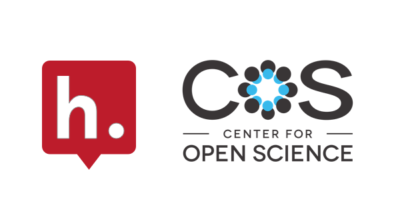Hypothesis and the Center for Open Science Collaborate on Annotation
 To enable peer feedback, collaboration and transparency in scientific research practices, Hypothesis and the Center for Open Science (COS) are announcing a new partnership to bring open annotation to Open Science Framework (OSF) Preprints and the 17 community preprint servers hosted on OSF. The partnership enables researchers to engage with each other, discuss research and share additional information as part of the regular research workflow. Services currently hosted on the OSF Preprints platform include AgriXiv, Arabixiv, BITSS, EarthArXiv, EngrXiv, FOCUS Archive, FrenXiv, InaRxiv, LawArXiv, LISSA, MarXiv, MindRxiv, NutriXiv, PaleorXiv, PsyArXiv, SocArXiv, and SportRxiv.
To enable peer feedback, collaboration and transparency in scientific research practices, Hypothesis and the Center for Open Science (COS) are announcing a new partnership to bring open annotation to Open Science Framework (OSF) Preprints and the 17 community preprint servers hosted on OSF. The partnership enables researchers to engage with each other, discuss research and share additional information as part of the regular research workflow. Services currently hosted on the OSF Preprints platform include AgriXiv, Arabixiv, BITSS, EarthArXiv, EngrXiv, FOCUS Archive, FrenXiv, InaRxiv, LawArXiv, LISSA, MarXiv, MindRxiv, NutriXiv, PaleorXiv, PsyArXiv, SocArXiv, and SportRxiv.
The partnership builds on the foundations laid by the publication of web annotation as a standard by the W3C, and the pioneering work by Hypothesis to build an open annotation infrastructure and by COS to offer OSF, a comprehensive platform for open scientific research and publication. Hypothesis and COS plan to launch initial annotation capabilities for OSF Preprints and the eighteen partner services hosted there in the first half of 2018, building on preliminary work already tested by both partners.
This announcement builds on a community discussion held 25 January 2018 at the Sloan Foundation offices in New York City. There, many of the scholarly preprint services gathered in person or remotely to discuss potential benefits and considerations in bringing annotation to article preprints. A summary of the conversation is available in a blog post.
“The ability to collaborate openly and easily is a critical component of scientific discovery,” said Brian Nosek, COS’s Executive Director. “Hypothesis has developed a valuable tool that enables that communication throughout the research workflow. It’s a very powerful commitment to transparency.”
“COS and Hypothesis both share the common goal of making research more efficient, transparent and reproducible,” said Hypothesis’ Founder and CEO Dan Whaley. “Bringing open annotation to the OSF platform will provide their community with a powerful, standards-based way to provide feedback, share insights, hold group discussions and take and organize personal notes. Annotation helps bring peer input to exactly where it’s relevant and at a time when authors are most receptive.”
To learn more about adopting open annotation in your own publications, contact Heather Staines, Director of Partnerships at Hypothesis and subscribe to news from Hypothesis.
Anyone interested in joining the ESSOAr community can contact essoar@essoar.org.
About COS
The Center for Open Science (COS) is a non-profit technology startup founded in 2013 with a mission to increase openness, integrity, and reproducibility of scientific research. COS pursues this mission by building communities around open science practices, supporting metascience research, and developing and maintaining free, open source software tools. The Open Science Framework (OSF), COS’s flagship product, is a web application that connects and supports the research workflow, enabling scientists to increase the efficiency and effectiveness of their research. Researchers use the OSF to collaborate, document, archive, share, and register research projects, materials, and data. Learn more at cos.io and osf.io.
Contacts
Media: Rusty Speidel: rusty@cos.io | 434-284-3403
Starting a Branded Preprint Service: Matt Spitzer: matt.spitzer@cos.io
Twitter: @osframework
Web: https://cos.io/preprints